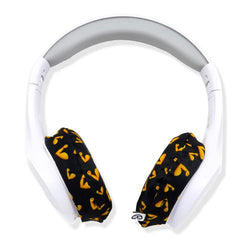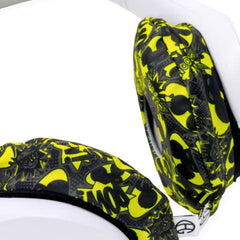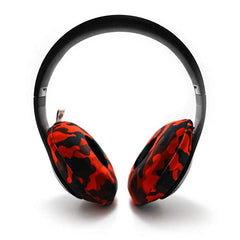How to Workout Without Music

It’s strange that a website selling sweat proof headphone covers wants to talk about working out without music.
How many of us have skipped a workout or cut one short because we arrived at the gym without headphones?
But could listening to music during exercise be a crutch: something we’re relying on with no real benefit at all?
Could unplugging really improve your fitness and form?
Do You Over Depend on Music?
Most of us have rituals or habits that we believe make us better at what we do and especially if we’re doing something that’s outside our comfort zone.
Take public speaking, for example.
Many people don’t enjoy standing up and talking to an audience. It could be a college presentation or a best man’s speech, for example.
Some people may be tempted to have a swift glass of something alcoholic beforehand: Dutch courage is a short-term confidence boost that some of us absolutely swear by.
Smokers often argue that cigarettes calm them down but we know it’s not true; satisfying the addiction makes them less anxious rather than the actual cigarette itself.
Could listening to music be the same for you?
Do you exercise in headphones because you think you want a distraction or does it make you think that you won’t notice the burn so much? Is it because you think you’ll be bored otherwise or that you’ll be too self-conscious?
And think about how rarely any of us actually are.
We can watch films on our phones. We listen to albums when we’re walking. We wear noise-cancelling headphones in busy offices or on packed commuter trains. We check our emails in between restaurant courses. People even take their phones into the toilet with them.
Our minds no longer have a quiet space in which to just be.
Exercising with music could be a missed opportunity to switch-off properly, but it does sound really, really scary, doesn’t it?

Exercising with Music: Why It Can Be Bad for Us
Music is a distraction.
Music during exercise helps us forget how long we’ve been running or how difficult a particular set of reps are. The problem is that distractions can upset our form and this can lead to injury or poorer performance.
One study by the University of Florida found that runners who were distracted tended to hit the ground harder. Participants also had higher heart rates and heavier breathing than those who ran without any distractions.
We already know that when we get tired our form can suffer and that not only makes us more prone to injury but it can also undermine our performance.
Emily Laurence for the Good Sweat website spoke to, Ryan McCann, the founder of the Cool Fit Club who believes that breathing and form are very important and if you don’t have them down right, then you’ll never feel comfortable and if you don’t feel comfortable then you’re always going to rely on music to get you through.
If you’re slipping, if your form is incorrect, then it’s much easier to notice when you don’t have any noise distractions: you’re more conscious of what you’re doing and correction becomes instantaneous helping you to have a better and safer workout.
McCann goes on to say that it’s easier to listen to your body, too, with breathing a good indication of when it’s time to slow down. Paying attention to how you’re reacting to your pace, environment and performance could give you the inside track on finishing stronger and faster without the crutch of Taylor Swift or Def Leppard.
Exercising outdoors with headphones can be dangerous.
It’s important to be able to notice any oncoming threats or dangers and music can easily drown out these warning signs. Women can sometimes be additionally vulnerable when they’re running alone as headphones can mask the approach of an attacker.
Get Your Thoughts in Order
People who regularly exercise without audio often say it’s an opportunity for thinking. Repetitive activities have been shown to improve creative thinking much in the same way that people get an AHA! Moment in the shower. Concentrating on intense beats or lyrics as a way to escape repetition could rob you of some of the solutions to your biggest problems.
You Could Lose Your Hearing
Tougher workouts might call for louder volume and that can cause permanent hearing damage. In 2019, the World Health Organisation (WHO) added leisure noise to its list of dangers to human health. Listening to loud music could impact how you hear sound throughout your life.
How to Workout Without Music
-
Give it a fair go. You’re probably going to find the first few times tough and it’ll feel strange and lonely and probably a little dull BUT there are benefits to be had so have some patience. Start small or split your sessions into music and non-music and see what happens; don’t just try it once and then throw the towel in.
- Exercise indoors? Take it outside. Get off the treadmill and hit the road or the trail. Hearing nature or seeing urban life playing out in real time may very well be as interesting as the playlist you downloaded three months ago.
-
Concentrate on your breathing and your posture. If you feel yourself getting tired, focus on those parts of your body that feel heavier or seem harder to move. This could be relaxing your jaw or arms or dropping your shoulders and lifting your neck. Become mindful of what’s happening to your body and counteract it accordingly. You may find yourself correcting mistakes that have been costing your performance.
-
Grab a friend and exercise with them. It’ll help motivate you and give you a reason not to put the headphones on. If you’re able to have a conversation when you’re working out then it’s a great way of combining social ability with burning calories.
- If you’re not convinced but want to give it a try, then why not sign up for a running event that bans music? You’ll have no choice but to exercise without audio but you’ll also have a goal, too. Sometimes, it’s easier to follow a new pattern of behaviour if there’s a reason behind why we’re doing it.
Exercise is all about effort so expect to put some in when making the switch from sound to silence. Give it a proper go and see what benefits you discover.
If you’re unwilling to entirely give up your headphones, then remember to add sweat-proof covers to your cushions to help prevent moisture from ruining your sound.





